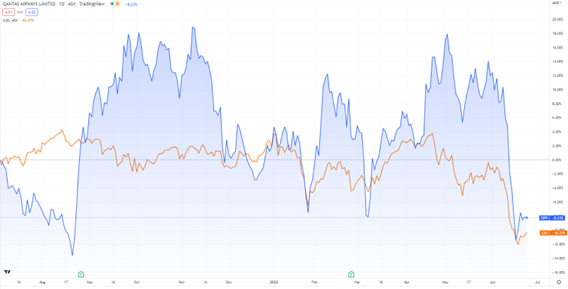Australia’s largest airline Qantas [ASX:QAN] will cut domestic capacity by 15% in FY23 due to ‘sustained high fuel prices.’
The thinning of domestic capacity won’t help Qantas’s recent PR struggles.
Just yesterday, the Australian Financial Review reported that one in every 13 Qantas flights was cancelled in May ‘as the airline battled reliability issues, raising questions about the sharp COVID-19 cost cuts and reasons for scrapping services.’
QAN shares were largest flat on the market update, however, with the travel stock experiencing a volatile 12 months.
QAN shares are down 10% year to date.

Source: Tradingview.com
Qantas market update
Qantas began its market update by pointing to ‘continued strong travel demand’ across domestic and international markets.
This demand has shrunk QAN’s net debt to ‘well below pre-COVID levels.’
QAN said its net debt position improved by $1.5 billion in the past six months.
It also took the opportunity to address the recent public bitterness at what the airline describes ‘has been a challenging restart for the industry globally,’ while thanking customer patience.
As if to quell contempt, Qantas said there will be staff increases to cover the June holiday-period, adjustments to flight schedules, and installation of extra check-in and baggage kiosks.
Despite the reduction in debt, Qantas expects a ‘significant full year Underlying EBIT loss for FY22 that includes the worst of the Delta and Omicron impacts.’
However, Qantas does think it is ‘on track to Underlying profit in FY23’.
The airline showcased its ‘strengthened’ position by announcing a $5,000 ‘recovery boost’ for 19,000 employees.
Prior to the bonus, there was a two-year-long ‘wage freeze’, which the group intends to improve with an upcoming 2% annual pay rise.
Oil and fuel price spikes remain a concern for the air travel company, which announced ‘domestic capacity reductions’ must cover the rise in prices.
Qantas said these adjustments should offset the fuel-price pinch, reducing domestic flights 106% pre-COVID levels by the second quarter, 110% by the third quarter.
Jetstar CEO to depart
Qantas also revealed long-serving Jetstar CEO Gareth Evans will be leaving the company in December.
Qantas Group CEO, Alan Joyce, said:
‘Gareth has been a superb leader and member of the senior executive team for many years. He’s given an incredible amount to the organisation in several key roles, from his time as CFO through major restructuring and most recently as Jetstar CEO as we navigated COVID.
‘When he leaves next year it will be with our sincere thanks and best wishes. We spend a lot of time developing our internal talent pipelines for succession opportunities like this and we’ll be appointing a new Chief Executive for Jetstar soon.’
QAN faces angry travellers
While Qantas did reveal a decrease on debts today, it didn’t have much to say about its revenue.
No explanation was given as to the planned exit of Jetstar CEO Gareth Evans, either.
All the while the public has been expressing some rather choice views on Qantas’s conduct; flight cancellations, flight delays and issues over the airline’s general services.
Given the distance domestic travellers must cover to get from one Australian state to another, consensus is these flights are of just as much importance as international travel.
But Qantas seems to think it’s a reasonable sacrifice.
While facing big inflation and oil price anxiety, many markets are forced to make some difficult choices — some sacrifices can’t be avoided.
But is this the case for all markets? Every business?
Our experts at the Daily Reckoning believe there are actually some stocks out there that can protect your income right now.
Check out the free report Five ‘Inflation Buster’ Stocks for 2022’ to find out more.
Regards,
Kiryll Prakapenka,
Money Morning

